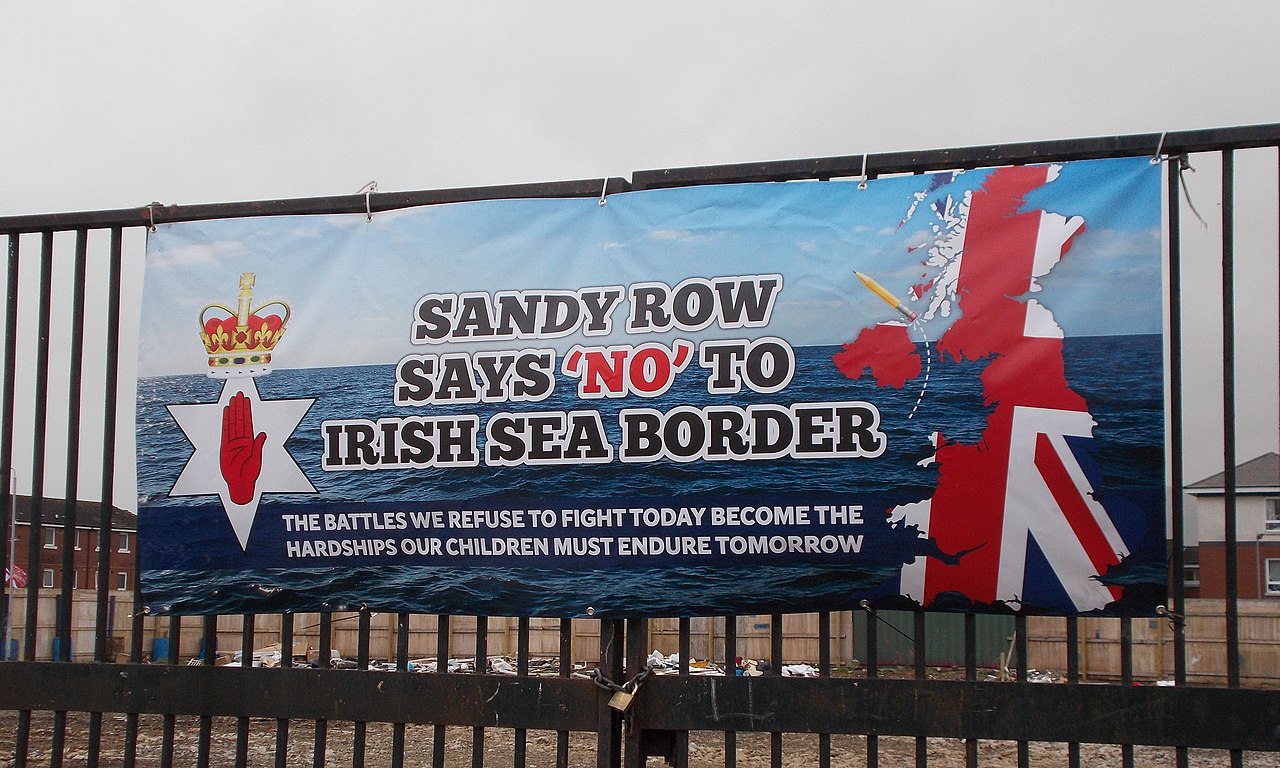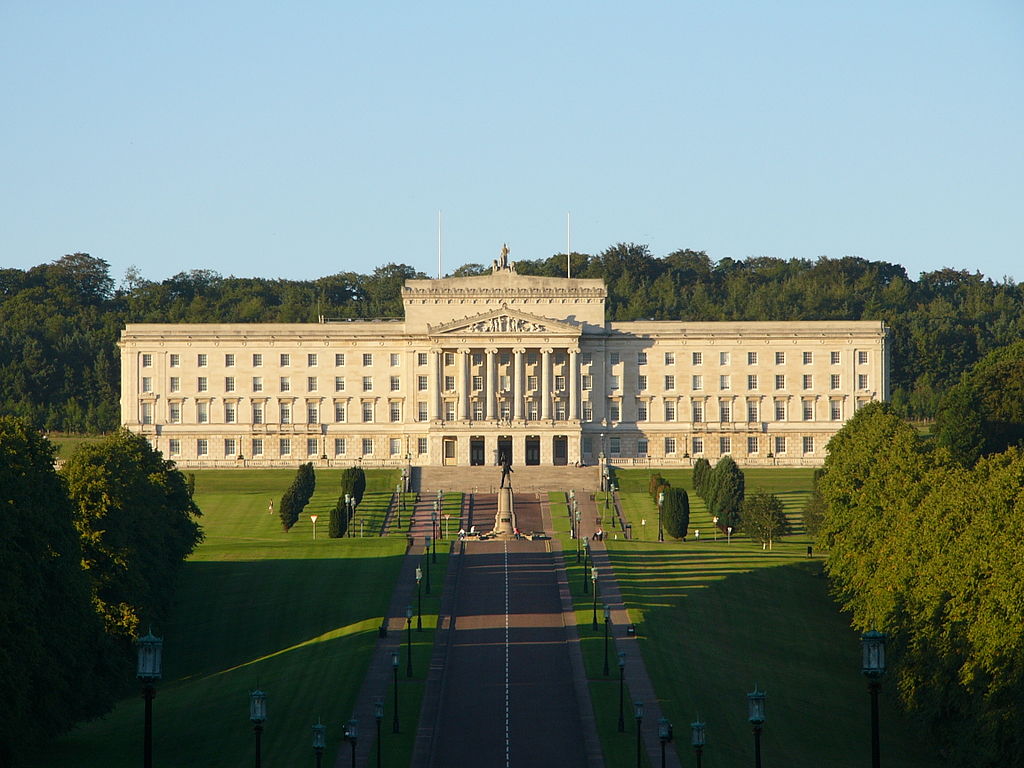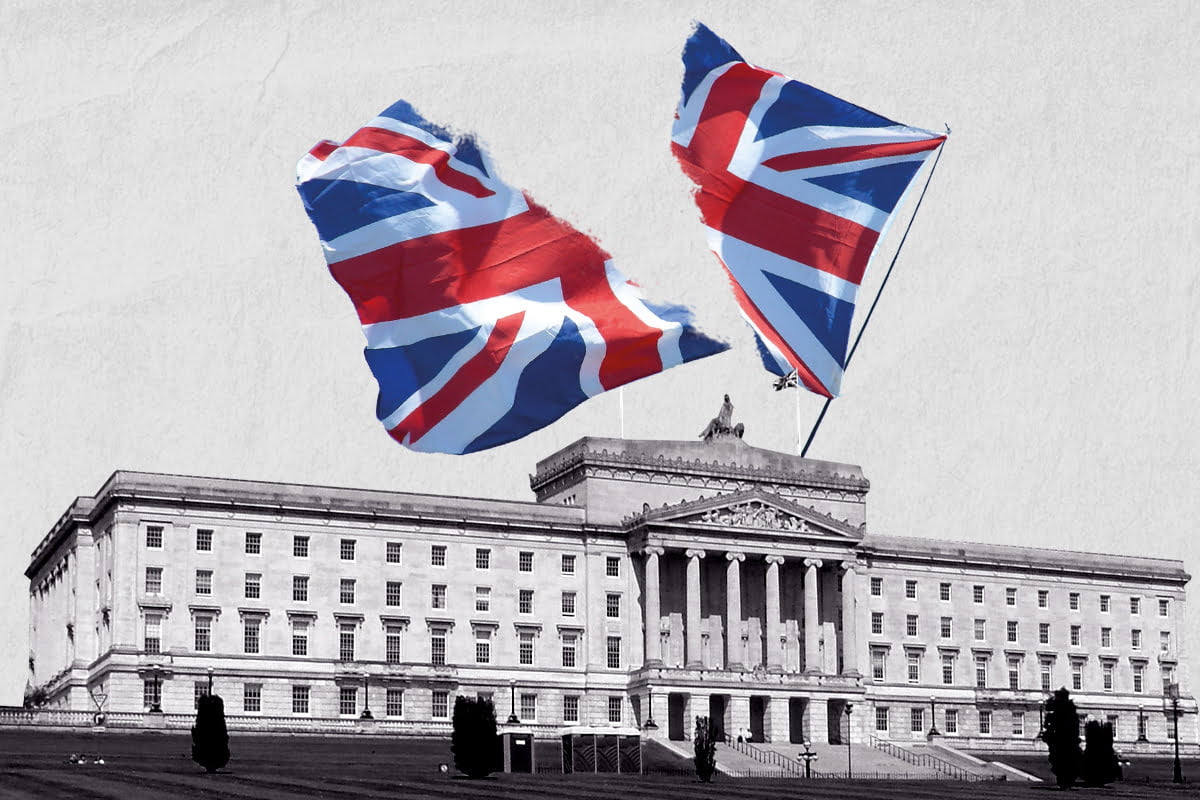The war in Ukraine could not have come at a better time for Boris Johnson, providing a welcome distraction from the #Partygate scandal.
It has also provided a welcome distraction for Tory foreign minister Liz Truss. Until Russian tanks rolled into Ukraine, she had been given the unenviable job of renegotiating the Northern Ireland protocol of the Brexit withdrawal agreement.
Now she can don a flak jacket and an army helmet, and preen before the cameras – the would-be Iron Lady-in-waiting, queuing up to take the reins of the Tory Party when the Ghost of Christmas Parties Past catches up with Johnson.
But whilst she can flee from the problems in the north of Ireland to save her own career, those problems are not going away. In fact, they are coming to a head thanks to Brexit. A massive crisis of Unionism is brewing, now reaching comical proportions.
Get what you pay for

Brexit was always going to present the British ruling class with a riddle they couldn’t solve: how can the south of Ireland remain inside the EU Common Market, and the UK outside the Common Market, without some sort of border?
Theresa May tried to fudge the question with a soft Brexit. But the DUP rejected that, and instead courted Johnson, who wrapped himself in the Union Jack.
And when Johnson became prime minister, what options did he have? If he wasn’t going to have a soft Brexit, he would have to agree to a border. The EU would accept nothing less.
Either you have a border on the island of Ireland, or you have it between the north of Ireland and Britain. And the latter is what Johnson agreed to – not that he especially cared what form Brexit took. Johnson only cared about ‘Getting Brexit Done’ back in 2019, in order to “whack Corbyn” in the election, to quote Dominic Cummings.
That was two years ago. And yet, in early February this year, DUP MP Ian Paisley Jr. got up in Westminster to share a great revelation with his fellow Honourable Gentlemen. It has come to his attention that unionists might have been misled!
“There is a fear that the Conservative and Unionist Party which governs this nation is actually an English nationalist party. That it’s not concerned about a border in the Irish Sea, but about a ‘Red Wall’ on the island – the mainland island – and that’s what eats them up every single day. And if that is their only concern, then the government is betraying the Union and the unionist people.”
The penny has finally dropped for the DUP, and they aren’t having any of it. In February, their First Minister resigned; and, after barely two years in existence, Stormont is again without an executive.
Of course, the DUP have been crying foul about the Northern Ireland protocol for two years. What is significant is the timing of the latest political crisis. Elections to the Northern Ireland Assembly are impending in May. They are likely to be catastrophic for the DUP – and unionism more broadly – and the DUP are scrambling to save their own skin.
Disunited Unionism

The last year has been one to forget for the DUP. The Northern Ireland protocol has stirred up anger and turmoil in their reactionary base, who perceive it as a step towards a united Ireland.
At its nadir last year, the DUP was on 16% in the polls, dropping to second place behind Sinn Féin, which it trailed by nine points. But it was only four points ahead of the right-wing Traditional Unionist Voice (TUV) in sixth place in opinion polls.
Today, the party has recovered a couple of percentage points, but it remains consistently behind Sinn Féin, which is set to emerge as the biggest party in May’s elections.
Such an outcome would be an electoral earthquake. And its prospect has provoked an acute crisis in unionism. It would be the first time that a nationalist party has topped the polls in the north.
The unionist parties are aghast, accustomed as they are to lording it over the nationalist population. Now they are the ones expected to stoop to the indignity of being ‘deputy’ First Minister to a Sinn Féin First Minister.
Jim Allister of the TUV summed this attitude up well when he told his supporters: “I can tell you this party will never be bridesmaid for Sinn Fein.”
The crisis is deepening the polarisation that is tearing unionism apart. Some see the collapse of Stormont as meaning just more instability, and are happy to swallow the protocol if it means they can get on with life. But another layer, particularly in working-class loyalist communities, feel utterly betrayed and left behind.
And this sense of betrayal and neglect – by the British state, by the Tory Party, and by unionist politicians – is being latched upon by the DUP, and by the TUV, who have outflanked them from the right. The latter are calling for the collapse of Stormont, and any and all means to bring down the NI protocol.
This polarisation was illustrated in a recent poll that showed that 90% of UUP voters opposed collapsing the Stormont Assembly, whilst 90% of TUV voters supported collapsing it.
The DUP, meanwhile, have tried to sit between these two stools. Watching with panic as their voters streamed away in both directions, they decided to collapse Stormont and lurch to catch voters drifting towards the TUV.
This hasn’t necessarily turned the opinions of those to whom they hope to appeal – as the DUP’s MP Sammy Wilson found to his cost when he tried to address a demonstration against the NI protocol and found himself being jeered; that was, until the TUV’s Jim Allister stepped in to calm the crowd.
TUV leader Jim Allister had to intervene during DUP MP Sammy Wilson’s speech at an anti-protocol rally after the crowd booed and jeered him. Jim Allister urged the crowd to listen to him but said to make their anger known on Election Day. pic.twitter.com/6RjK5y2Qg2
— Cate McCurry (@CateMcCurry) February 18, 2022
And, heaping further embarrassment on the embattled party, it has now been alleged by UUP leader Doug Beattie that the present DUP leader, Jeffrey Donaldson, had actually entered into negotiations with the UUP to jump ship shortly before he became DUP leader!
If the party leader doesn’t have confidence in his own party, how can its voters? When Donaldson denied the claims, Beattie threatened to publicly expose him.
Mind you, Beattie hasn’t been spared from unionism’s omni-fiasco of late either, as a litany of his old racist and misogynistic tweets found their way into the cold light of day.
If the ease with which unionist politicians hop between one party to the next doesn’t convince us that there’s no fundamental difference between the unionist parties, then Beattie’s tweets ought to.
When it comes to bigotry, there isn’t a cigarette paper of difference between them. They are all professional misleaders of working-class Protestants, to whom they offer nothing.
Historic crisis of the Union
The crisis of unionism is historic. The partition of Ireland 100 years ago was based from the start on Protestant supremacy over the Catholic population in the north.
For the first fifty years of the statelet’s existence, the one-party dictatorship of the Ulster Unionist Party (UUP) lauded it over the Catholic minority, who were discriminated against in jobs and housing, denied proper voting rights, and subject to brutal repression.
Throughout the Troubles, the province was subject to direct rule from London. Republicans and the Catholic community were at the receiving end of the full blunt force of British imperialism: from mass internment, house-to-house raids and shoot-to-kill, to outright collusion with loyalist death squads.
The Good Friday Agreement, signed back in the 1990s, was presented as the end of all that. But it merely repackaged unionist supremacy in another form. The unionist parties maintained their veto against any unagreeable legislation, enabling them to maintain the status quo.
This veto has been applied liberally by the DUP over the past decade: against equality for the Irish language; marriage equality; abortion rights; and other basic democratic rights.
And, if it wasn’t clear enough, nationalists were made to know their place insofar as they would take the deputy First Minister role, and the unionists would take the First Minister title – despite both roles having equal powers.
Some have toyed with the idea of replacing the titles ‘First Minister’ and ‘deputy First Minister’ with ‘joint First Minister’. But playing with words can’t mask unionism’s decline.
At its root are several causes. On the one hand, demographic change has shifted politics in the north of Ireland. At the time of partition in 1921, Protestants represented two-thirds of the population. Today, Catholics are a majority at all levels of education and in employment.
But there is more to the crisis of unionism than demographics alone.
In the past, the Protestant bosses in the north of Ireland could partially rally working-class Protestants in a cross-class alliance in defence of the union. This was possible on the basis of the fact that conditions for Protestants were relatively better than those of Catholics; and on the basis that the pluses and minuses would be reversed should Protestants become a minority in a Catholic-majority united Ireland.
The fact that these were relative privileges should be stressed, as the divisions that the bosses introduced into the working class allowed them to drive down conditions across the board. To this day, the pay and conditions of workers in the north of Ireland – Catholic and Protestant – are among the worst to be found anywhere on these islands.
These privileges were based on the skilled jobs that existed in heavy industry. Whilst, on average, conditions remain worse for Catholics, the old industries are now gone.
The capitalist class have taken their capital elsewhere and have left Protestant workers holding very little other than the paraphernalia of British imperialism: the flag, the monarchy, and a mythologised history.
Furthermore, the Tory government have shown how they really regard the region and its inhabitants: as an irritating afterthought. They have been lied to and defrauded.
Unionist demagogues, with nothing better to offer Protestant workers, have latched onto that sense of bitterness. They are warning them of another betrayal: that the British state and the EU are planning to bump them into a united Ireland behind their backs; that they are already a discriminated-against group in terms of policing, in education, in the civil service, etc.
These are all sectarian lies of course. But they are lies that will find fertile soil unless the advanced layers of the working class from both communities can raise their own political party that can offer a class solution.
Suffocating under capitalism
Constitutionally, very little will actually change in the event of a Sinn Féin victory in May.
If the unionist parties can be coaxed into coalition, the status quo will trundle along. And the NHS will continue to be deprived of funding. And workers will continue to suffocate under the weight of a cost of living catastrophe.
And if the unionist parties refuse to enter a coalition, direct rule from London may ensue. And the NHS will continue to be deprived of funding. And workers will continue to suffocate under the weight of a cost of living catastrophe.
Only a class-based programme can channel the bitterness and anger in all working-class communities against its proper target: the capitalist system.






